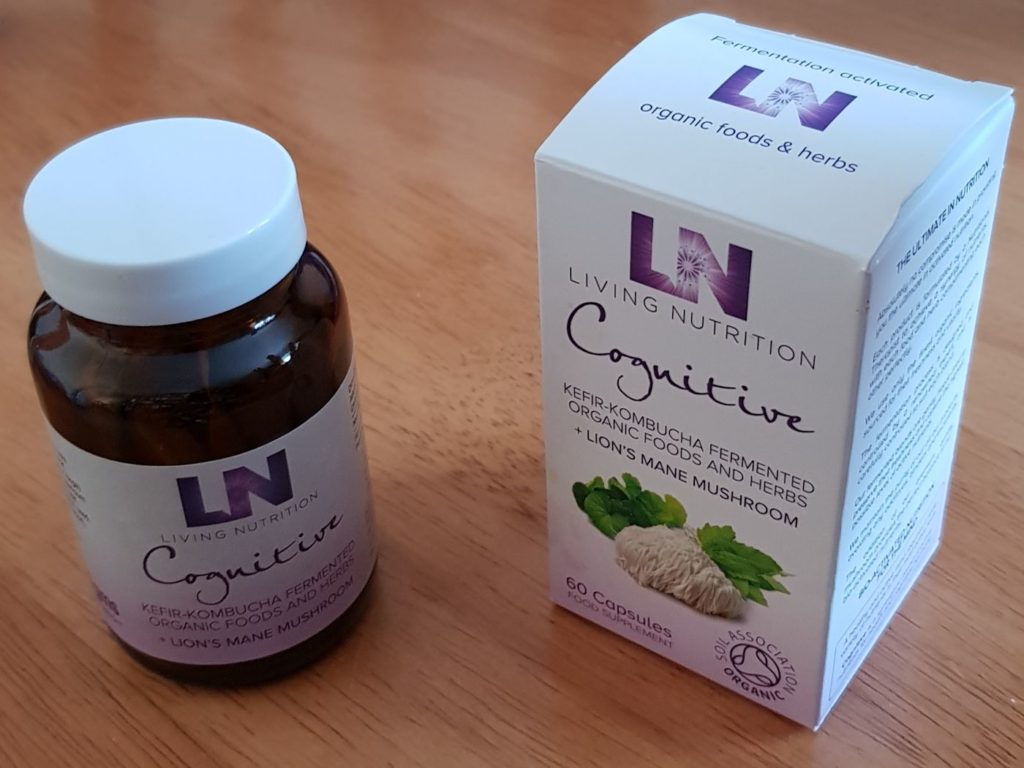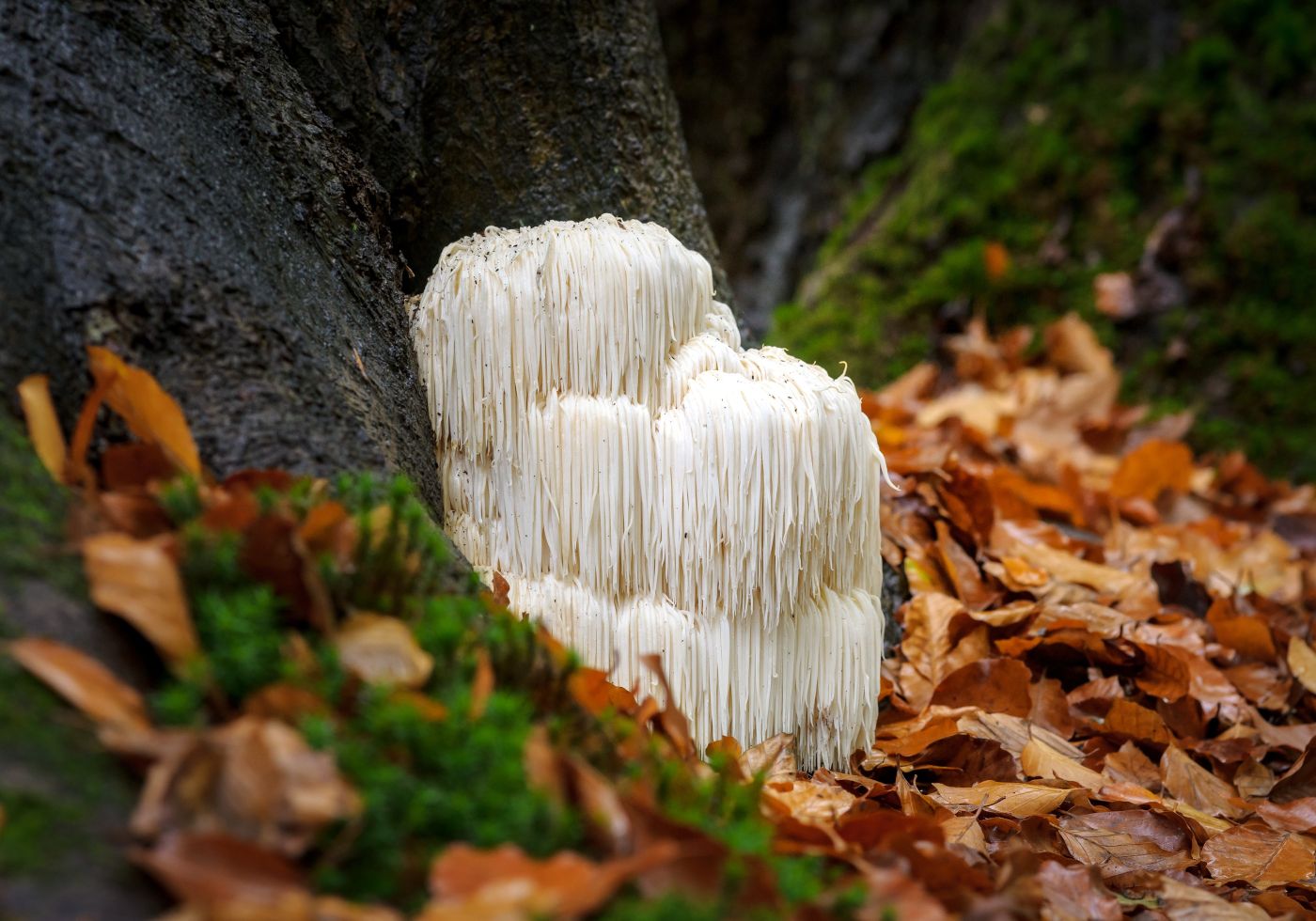Lion’s mane is an edible mushroom that is often used in food supplements, but what benefits does it offer?
The lion’s mane mushroom is a large fungus with a distinctive shaggy appearance and a long history in Chinese traditional medicine. It’s known for its nootropic ability to focus your mind and keep your brain alert. It is also an adaptogen and can restore a healthy balance to your body’s vital systems.
With these qualities, Lion’s Mane could be a powerful addition to your daily supplement routine.
What is lion’s mane?
Lion’s mane is a fungus that grows on the limbs of dead or dying trees. Capable of growing larger than a football, it can be found in Japan, China and Europe. It gets its name from its shaggy appearance and long, flowing hair-like tendrils.
In some areas, its flavour and texture have given it a reputation as a gourmet delicacy, but it is most often used for its health benefits. For centuries it’s been used in traditional Chinese medicine and was thought to aid in digestion and improve the health of your main internal organs.
More recently, it is considered a superfood and is often dried to make a natural remedy or supplement. Many of those who use it report that it can enhance your general health, sharpen your mind and delay the effects of ageing on your brain.

I recently bought Living Nutrition’s Lion’s Mane Mushroom blend from for the Ageless, read my review to find out what I thought.
What is a nootropic?
Nootropics are substances that can enhance your brain function. They can perform several functions but are often used to improve your ability to think clearly and enhance your memory. While many compounds, natural and synthetic, are referred to as nootropics, a true nootropic does this without causing any significant negative actions.
There is a growing debate around the use of nootropics with some people presenting evidence of their brain-boosting effects, while others are more sceptical. Those who remain unconvinced say that your time would be better spent getting a good night’s sleep and eating a diet of nutrient-rich foods.
Does lion’s mane give you energy?
Given the potential of lion’s mane to provide nootropic effects, it’s understandable that people may think that it also gives an energy boost. Actually, it provides an increase in awareness and memory but doesn’t provide any stimulating or energetic effects.
Does lion’s mane contain caffeine?
Caffeine is another well-known nootropic and is often used as a stimulant and can improve brain function for a short period. However, lion’s mane contains a range of useful substances, including polysaccharides, but no caffeine.
Does lion’s mane mushroom get you high?
Lion’s mane mushroom is non-intoxicating and won’t get you high. While you may feel a sensation of alertness and clarity, users don’t report any ‘high’ or feeling of any loss of control.
What is an adaptogen?
Adaptogens are substances that can enhance your resistance to external and internal stress. While there is still a lot to learn about how they function, it is currently thought that they produce an anti-fatigue effect. This effect increases your brain’s ability to work for longer, while under pressure.
There are many adaptogenic substances, and while they share similar functions, they often have slightly different effects. A recent study discovered that the ability of an adaptogen to improve your resistance to stress comes from enabling your homeostatic mechanism.
This is when your body systems respond to changes or problems by restoring balance. By allowing your body to correct itself for longer, your brain can remain alert in times when it usually would become overwhelmed.
This goes some way to explain why Lion’s mane has so much potential as a supplement. Not only can it improve your focus, but it does it by enhancing your whole body’s ability to remain in balance.
The benefits of lion’s mane
Lion’s mane has several benefits that can add to your overall sense of health and wellbeing:
Could support heart health
The research is in its early stages but it has begun to show positive links between the lion’s mane mushroom and a reduction in some of the risk factors for heart disease. These include lowering levels of triglycerides; one study observed a 27% triglyceride decrease in rats following a high-fat diet and daily amounts of lion’s mane extract.
It has also been found to reduce the amount of cholesterol oxidised in the bloodstream and the rate of blood clotting. Each of these effects has the potential to be useful in improving heart health, but human studies have yet to be conducted.
Reduces some of the signs of dementia
One of the most exciting effects of lion’s mane is its potential to slow down some symptoms of certain neurodegenerative disorders. While there are no studies that have yet been able to show this specific effect in action, research has had success showing an improvement in brain function.
One particular study with older adults showed an increase in cognition while taking a regular 3 grams of lion’s mane. It has also been observed reducing memory loss in mice.

It’s a powerful antioxidant
Several studies have shown that some of the compounds found in lion’s mane mushrooms act as antioxidants and can reduce the damage caused by free radicals. Free radicals produced by oxidation occur naturally in our bodies and are balanced out by antioxidants.
When they are present in higher numbers than the antioxidant, oxidative damage results, this is linked to several illnesses and chronic conditions.
Displays anti-inflammatory effects
Like oxidative damage, inflammation is a contributing factor to a wide range of diseases and conditions. Several animal studies have been able to demonstrate the lion’s mane’s ability to reduce the inflammation in several different situations.
This effect could also link lion’s mane to good gut health and a reduction in some digestive conditions.
Boosts your immune system
There is a growing body of evidence to show that it can improve the function of the immune responses located in your intestines. This is one of your body’s first lines of defence and aims to destroy pathogens before they can enter your bloodstream.
Improves focus and reduces stress and anxiety
It has also been linked to some incredible brain-boosting properties, including reducing stress and anxiety. It could aid in the growth and regeneration of brain cells and consequently have a neuroprotective effect. This may reduce the risk factors for some conditions like ischemic stroke.
Regular consumers of lion’s mane also report that it can improve their mood, improve focus and allow them to continue some mentally exhausting tasks for longer.
Can lion’s mane be taken with other natural supplements?
Another feature that makes lions mane ideally suited as a wellbeing supplement is that it works well alongside other nootropics and beneficial substances. Turmeric, ginger and green tea are often used in combination with it. They make great companions for lion’s mane because they contain a wide range of essential compounds and vitamins.
By taking them together, you can increase the range of positive effects. Some lion’s mane capsules include several other ingredients to create the largest cumulative effect. These combinations are sometimes called stacks.
How can you take lion’s mane?
While the lion’s mane mushroom can be cooked and eaten, it may also be taken as a supplement. It can be found as liquids, tablets and powders, but the easiest and most discreet method is to use capsules.
Capsules provide you with a standard dose that is easy to carry and store. They can be taken discreetly anywhere and washed down with some water.
How much lion’s mane should you take?
There is no standard measure for lion’s mane because its effect can depend on many different factors, including body composition, pre-existing conditions, metabolism and body mass. Most supplements provide daily amounts of between 100mg and 2000mg.
As with any new supplement, it’s worthwhile to start with a small amount and gradually increase it when you know how it affects you. Start with the lowest measure directed on the packet you’ve chosen and if necessary, slowly increase it as directed.
If you’re taking any medications, speak to your doctor before starting any new supplements to ensure safety and rule out any interactions. Whenever trying any new products, keep a careful note of how you feel, if you have any concerns, stop taking it immediately and contact your doctor.
What are the side effects of lion’s mane?
Currently, there are very few side effects noted for lion’s mane, but the investigation into any negative effects is in its early days. It appears to have a good record of safety, but it’s always essential to be aware of how you feel when starting any supplement.
The only reactions noted by studies so far could be down to an allergic response and include shortness of breath, itchy skin and a rash.
When should you take lion’s mane?
Many supplement manufacturers recommend taking lions mane in three equal portions throughout the day. This strategy is also used in several studies that use lion’s mane or its extracts.
However, its ability to focus your mind is most useful in the morning or early afternoon. Taking it in the evening shouldn’t affect your sleep but may not provide any immediately noticeable effects.
Find out what I thought when I tried the Living Nutrition, Lions Mane cognitive blend.
Conclusion
When looking to boost your health and wellbeing with effective supplements, there is no better place to start than with the bounty supplied by nature. The lion’s mane mushroom already has a long history of benefiting health and is making a great impression in our modern world. Its possibilities and potential benefits make it an unmissable supplement.
My Supplement Recommendations
These are products that I currently use and enthusiastically recommend:
Multivitamin – Nutrigenesis Multi for Men or Nutrigenesis for Women. Performance Lab use their patented Nutrigenesis technique to provide a range of vitamins and minerals in their most effective form. Read my review.
Nootropic – Mind Lab Pro contains eleven natural nootropics that have been proven to support cognitive function and brain health. Read my review.
Collagen – Edible Health Bovine Collagen. This excellent bovine collagen powder is completely tasteless and absorbs quickly into any liquid. It’s third-party lab tested and provides 13g of collagen per serving. Read my review.
Turmeric – VitaBright Organic Turmeric with Ginger and Black Pepper. These turmeric capsules are organic, effective and affordable. They include black pepper to enhance curcumin absorption and ginger to provide additional useful benefits. Read my review.
Incredible value – G&G Vitamin 28 day packs This is the most affordable way to buy supplements in the UK. One tub holds 28 daily packs of up to 11 different vitamins, minerals or food supplements.
This site is a participant in the Amazon Services LLC Associates Program, an affiliate advertising program designed to provide a means for sites to earn advertising fees by advertising and linking to Amazon.co.uk. We also participate in programs from eBay, CJ, Awin, Viglink and other sites. We are compensated for referring traffic and business to Amazon and other companies linked to on this site.

